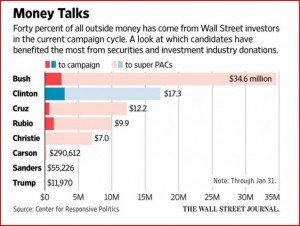
Hillary-Clinton-Told-Wall-Street
Submitted by Tyler Durden on 02/06/2016 10:38 -0500
Bernie Sanders has found the chink in Hillary Clinton’s political armor – and it has nothing to do with a private e-mail server.
The riley socialist has begun hitting the former First Lady hard on her liberal credentials, branding her a kind of wannabe progressive with an on-again off-again commitment to things like reforming the type of establishment politics that allow Wall Street to exercise undue influence on Capitol Hill.
In fact, Sanders has zeroed in on Clinton’s ties to the financial world’s biggest players including Goldman Sachs which has paid the Democratic frontrunner and her husband millions for speeches over the course of the last ten years. Those speeches in some cases coincided with Goldman’s efforts to lobby the State Department on issues that directly involved the bank.
Besides the speaking fees, Wall Street has also given more than $14 million to Clinton’s super PAC – the second highest total next to Jeb Bush. “I do not know any progressive who has a super PAC and takes $15 million from Wall Street,” Sanders said on Wednesday, at a town hall event organized by CNN.
“Enough is enough. If you’ve got something to say, say it directly,” Clinton said the next day, effectively daring Sanders to accuse her of being bought and paid for. She also said she would “look into” releasing the transcripts of her paid speeches. But by Friday morning, her campaign seemed to indicate that full disclosure was not forthcoming. “I don’t think voters are interested in the transcripts,” Joel Benenson, Clinton’s pollster.
Well actually voters are interested, and fortunately, Politico has an account of one recent address which underscores Sanders’ concerns. “Clinton offered a message that the collected plutocrats found reassuring, declaring that the banker-bashing so popular within both political parties was unproductive and indeed foolish,” Politico writes. “[She struck] a soothing note on the global financial crisis, she told the audience, in effect: We all got into this mess together, and we’re all going to have to work together to get out of it.” Here’s more:
What the bankers heard her to say was just what they would hope for from a prospective presidential candidate: Beating up the finance industry isn’t going to improve the economy—it needs to stop. And indeed Goldman’s Tim O’Neill, who heads the bank’s asset management business, introduced Clinton by saying how courageous she was for speaking at the bank. (Brave, perhaps, but also well-compensated: Clinton’s minimum fee for paid remarks is $200,000).
Certainly, Clinton offered the money men—and, yes, they are mostly men—at Goldman’s HQ a bit of a morale boost. “It was like, ‘Here’s someone who doesn’t want to vilify us but wants to get business back in the game,’” said an attendee. “Like, maybe here’s someone who can lead us out of the wilderness.”
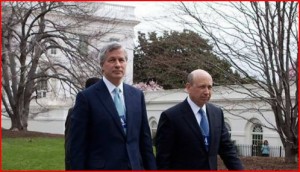
Jamie-Diamond-Bankers
Clinton’s remarks were hardly a sweeping absolution for the sins of Wall Street, whose leaders she courted assiduously for financial support over a decade, as a senator and a presidential candidate in 2008. But they did register as a repudiation of some of the angry anti-Wall Street rhetoric emanating from liberals rallying behind the likes of Sens. Elizabeth Warren (D-Mass.) and Sherrod Brown (D-Ohio). And perhaps even more than that, Clinton’s presence offered a glimpse to a future in which Wall Street might repair its frayed political relationships.
This is not the first time Wall Street has found itself at odds with one of the political parties in Washington. But it may be the first time since the Great Depression that the New York banker class has been this disconnected from both parties simultaneously.
The strained relations come at a consequential moment for the financial industry, which has rebounded from the 2008 financial crash faster and with bigger gains than the rest of the country, but is now facing the ire of newly emboldened and decidedly anti-Wall Street populists in both political parties. And yet the 2014 and 2016 election cycles will help determine whether banks, already restrained by the Dodd-Frank financial reform law, will face new regulatory restrictions, further rounds of legal action and higher tax rates. “Traditionally, Wall Street plays both sides of the fence on its political donations,” says Charles Geisst, a financial historian and professor at Manhattan College. “What’s happening now is neither side is coming through with the things Wall Street feels it is entitled to, and so everybody just wants to give up. But they can’t, because they are going to continue to be in the limelight whether they like it or not.”
“Like the rest of America, Wall Street is looking at Washington and saying whether we agree or disagree, they’re looking at both parties with complete revulsion,” one private equity executive told Politico.
Right. Wall Street is looking at Washington “with complete revulsion.” Except when it comes to Clinton. Who offers “a way out of the wilderness.”
Needless to say, Politico’s account only serves to underscore the notion that a vote for Hillary is a vote for business as usual inside the Beltway. A ballot for America’s entrenched political aristocracy, and a sure fire ticket to more of the same.
Politico’s account brings to mind an important question: could it be that the best candidate for America’s highest office isn’t even running?…
Stew Webb Radio Network
Listen Live
Breaking News
http://www.stewwebb.com
Listen live by phone
712-775-8269
federalwhistleblower@gmail.com



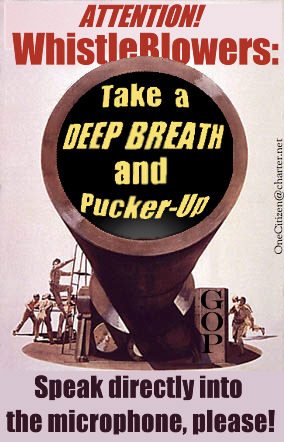
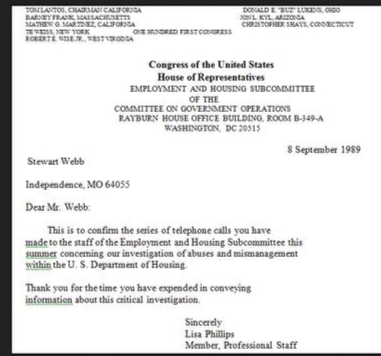
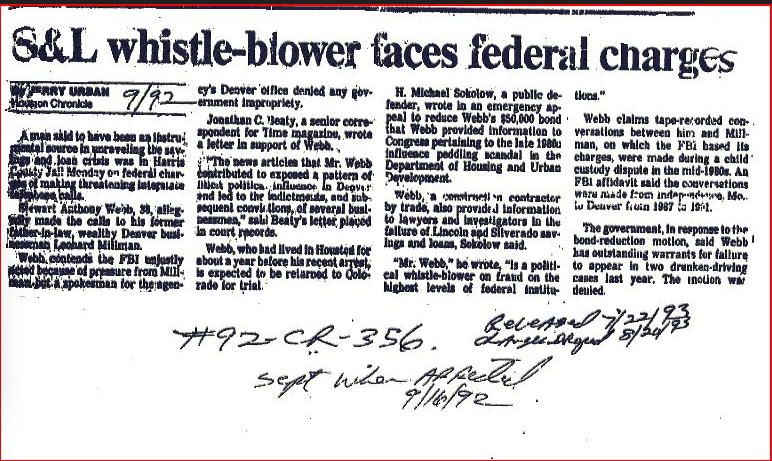
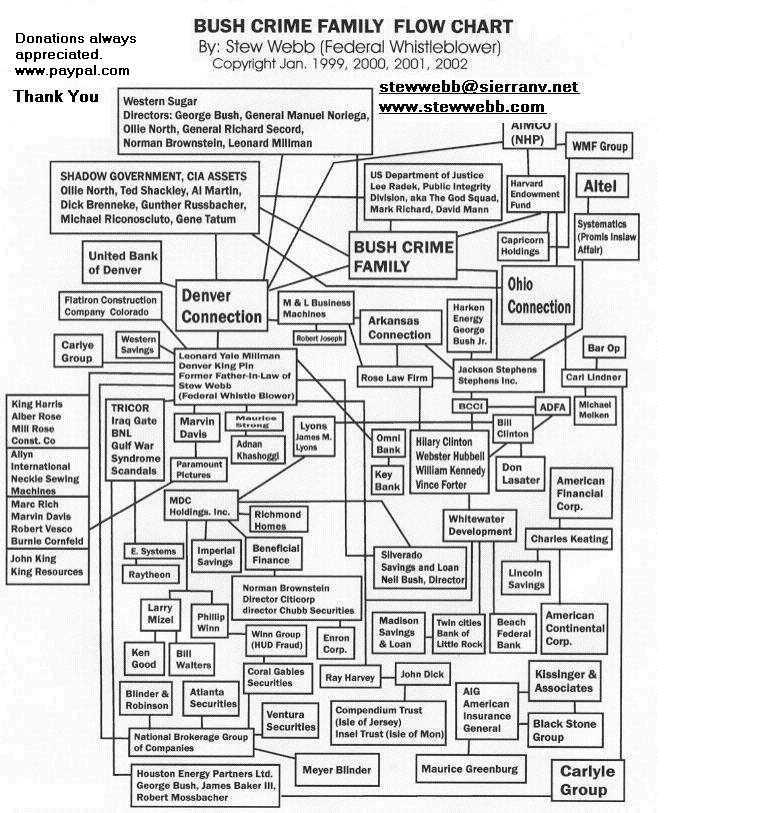
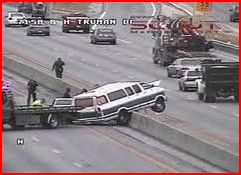



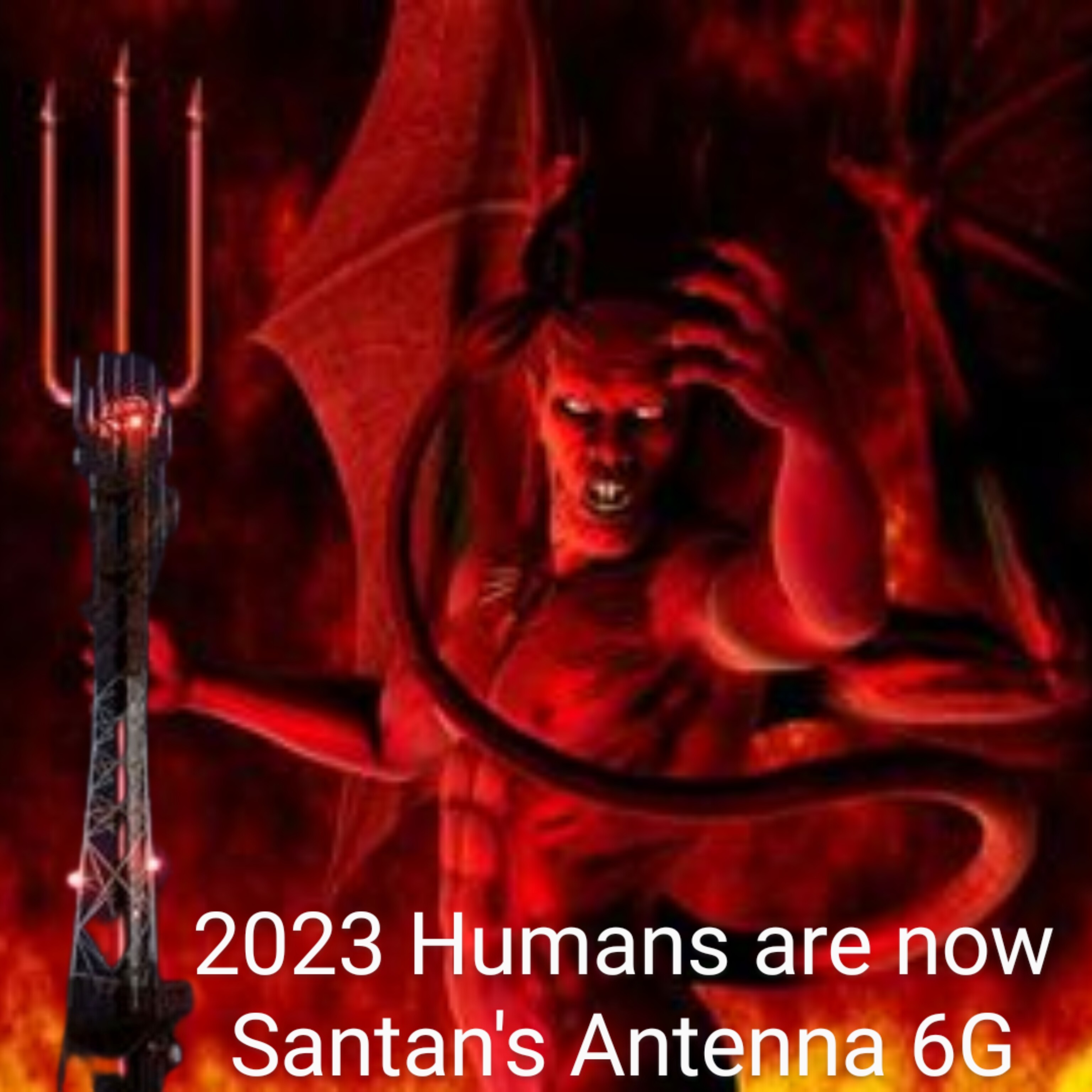

.jpg)

